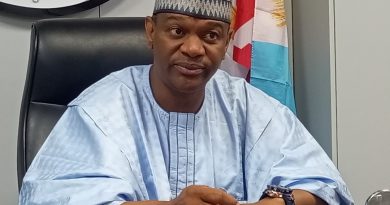Nigeria’s Return to the 2014 Nightmare, by Farooq A. Kperogi
Nigeria’s Return to the 2014 Nightmare, by Farooq A. Kperogi
The events and atmospherics of the past few days in Nigeria feel eerily and frighteningly familiar. They are redolent of the disabling instability and helplessness (and more) of 2014 and 2015 when Goodluck Jonathan was president.
Three crises are unfolding in near synchrony. One, there’s a resurgence of Boko Haram activities. Two, there’s an alarming escalation of mass kidnappings in the northwest and north central zones. And three, we’re seeing more coordinated banditry along major travel corridors in most parts of the country.
Each one has appeared before, but they almost never spike simultaneously unless something systemic has shifted. That alone raises alarms.
We have gone back to counting stolen children, watching shaky videos of terrified pupils, hearing anguished parents on television, and listening to federal officials who seem permanently shocked into inertia. The déjà vu is unsettling.
READ ALSO: AbdulRazaq Meets Security Chiefs as Fresh Tactical Teams Land in Kwara
This week, armed outlaws stormed a school in Kebbi State and abducted scores of girls in an attack that jolted the national conscience. Only days later, another gang invaded Papiri village in Niger State and snatched schoolchildren who were preparing for early morning classes.
The Niger State raid struck me with personal force because the village head of Papiri is my paternal second cousin. His mother is my father’s first cousin. In Borgu tradition, we’re considered cross cousins and therefore “joking mates.” I have tried to call him since news of the abduction broke without success.
At the same time, Jihadist violence in the northeast has recrudesced with chilling familiarity and renewed virulence. Islamic State West Africa Province and remnants of Boko Haram have regrouped around the Lake Chad basin. They attack civilian communities and security installations with renewed vigor.
From Bama to Marte, villagers describe nightly fear as if nothing has changed since the peak of Boko Haram’s reign a decade ago.
I earned the concentrated wrath of late president Muhammadu Buhari’s devotees in early 2018 when, in a February 24, 2018, column titled “Bursting the Myth of Buhari’s Boko Haram ‘Success’,” I pointed out that Boko Haram appeared to be defeated not because the government had done anything but because the group had been “weakened by an enervatingly bitter and sanguinary internal schism.”
It appears like the group has been able to overcome its internal dissension enough to be able to coordinate attacks on its targets.
Parallel to this resurgence is the evolution of kidnapping into a national business. What started as an insurgent tactic has been copied, refined and monetized by criminal gangs across the northwest and north central then exported to the south.
Independent trackers show that billions of naira have circulated through ransom payments over the past decade with recent reports describing a structured kidnap economy complete with financiers, logistics networks, informants, negotiators and money launderers. What Nigeria once called banditry has now matured into a rational industry with predictable revenue streams and diversified risks.
So, yes, the national atmosphere today resembles the Jonathan years. But this time the crisis is deeper and more dispersed.
The national mood of despair, helplessness and anger is a replay of the late Jonathan era when Boko Haram hoisted its flags over swathes of Borno and Yobe. Chibok became a global shorthand for Nigerian dysfunction. Now, the factually incorrect but emotionally resonant narrative of an exclusively targeted “Christian genocide” that spares Muslims has become the rallying cry to galvanize global attention to Nigeria’s growing insecurity.
Back in 2014, Bola Ahmed Tinubu was the most potent voice of the opposition. He excoriated Goodluck Jonathan for incompetence and indecisiveness, demanded his resignation and insisted that a president who allowed any part of Nigeria to fall under insurgent control had forfeited his legitimacy.
He was not alone. The opposition constructed a political identity around Jonathan’s inability to contain insecurity and many Nigerians embraced that narrative.
Fast-forward to 2025 and the roles have reversed. Tinubu is now president. Yet armed groups have carved out de facto fiefdoms from Sokoto to Zamfara to parts of Niger and Kwara.
Mass abductions of schoolchildren that once symbolized Jonathan’s collapse now occur with increasingly terrifying regularity on Tinubu’s watch.
The same constitutional structure that prevented Jonathan from responding with agility still binds Tinubu. The same centralized federal police that Jonathan could not reform remains unreformed. The same chorus of political rivals calling for resignation is back, this time directed at Tinubu.
To understand why Nigeria is once again trapped in this cycle one must follow the incentives. In 2014 Boko Haram sustained itself through robbery, looting, cattle rustling, bank raids and forced taxation of communities under its control.
Over time, the insurgency splintered. Islamic State West Africa Province emerged as a faction that taxed traders, herders and fishermen around the Lake Chad basin with a degree of predictable order. Boko Haram’s faction retained a chaotic violence that relied on spectacle and terror. Their internal war weakened both sides but did not erase the insurgent social structures that had taken root in northeast Nigeria.
In the northwest a different conflict economy germinated. What began as local clashes between armed herders and farming communities evolved into a sprawling banditry complex. Criminal groups discovered that kidnapping offered more lucrative returns than cattle rustling or territorial raids.
In time, the operations became systematized. Negotiators emerged. Safe houses and holding camps were erected. Ransom payments moved through informal financial channels. Corrupt intermediaries took commissions. A web of collaborators, enablers and silent beneficiaries flourished.
By 2020 analysts described Nigeria’s kidnap economy as a mature market with predictable seasonal variations. When cash became scarce, criminal groups shifted to looting harvests or taxing miners. When security forces pressured one corridor, criminals migrated to neighboring states. When the public grew desensitized to individual abductions, gangs resorted to mass kidnappings to restore bargaining power. The crisis became self-sustaining.
What sustains this national theatre of insecurity is not mysterious. A centralized and lethargic security structure leaves governors unable to respond to emergencies in their own states. Corruption drains operational resources and incentivizes some actors to prolong insecurity.
Youth unemployment in rural belts produces endless recruits for jihadist and bandit networks. Weak intelligence systems and politicized law enforcement create impunity. Communities that cooperate with the state face revenge attacks without reliable protection. Simplistic narratives, whether religious or ethnic, prevent honest diagnosis.
Yet this cycle is not irreversible. Nigeria needs genuine devolution of policing powers so that states can create accountable and competent security forces to supplement federal agencies. The kidnap economy must be treated as a financial crime problem that requires surveillance of ransom flows, rigorous enforcement of anti-money laundering statutes and prosecution of urban collaborators.
The military must purge procurement fraud and prioritize intelligence-driven operations that protect civilians rather than advertise body counts. Schools need real protective infrastructure, not empty safe school pledges. The state must rebuild trust with communities through accountability for abuses and consistent presence rather than episodic raids.
Nigeria also continues to avoid hard but necessary options. One example is the use of foreign military contractors to support counterinsurgency operations. In 2015 Goodluck Jonathan hired South African and Eastern European mercenaries who helped achieve some of the most significant territorial gains against Boko Haram in years.
Muhammadu Buhari cancelled the arrangement out of vain nationalist pride, and the momentum evaporated. Given the scale of today’s threats, Nigeria should reconsider specialized external support with proper oversight. What matters is saving lives, not protecting political egos.
Ten years ago, Nigerians rallied around the simple demand that their children should be safe in school and their villages safe from predation. A decade later, they are repeating the same plea. If it was fair for Tinubu to say in 2014 that no leader should preside over the occupation of Nigerian communities by non-state armed groups, it is fair to say the same to him now.
Nigerians want what they have always deserved, which is a country where sending a child to school is not an act of faith in divine mercy. They want a government that treats mass abduction not as an inconvenient blemish but as an intolerable crisis. They want an end to a nightmare that feels scripted to repeat itself every decade.
This is a pattern that can be broken. Whether it will be is the question that hangs over the republic.




